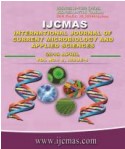


 National Academy of Agricultural Sciences (NAAS)
National Academy of Agricultural Sciences (NAAS)

|
PRINT ISSN : 2319-7692
Online ISSN : 2319-7706 Issues : 12 per year Publisher : Excellent Publishers Email : editorijcmas@gmail.com / submit@ijcmas.com Editor-in-chief: Dr.M.Prakash Index Copernicus ICV 2018: 95.39 NAAS RATING 2020: 5.38 |
Castor is an important industrial and medicinal plant, as raw material for thousands of compounds can be obtained from it. Castor contains a number of toxic compounds in different parts of the plant, ricin being the most potent. Highest concentration of inhibitors is found in seeds. These compounds show antimicrobial activity against different pathogenic bacteria. So, these toxic compounds can be used to prepare drugs to treat many diseases worldwide. Antimicrobial effect of castor was also seen against soil microbial community which in turn affects soil health and fertility. However, there are many physical, chemical and biological methods which help in degradation of castor inhibitors.
 |
 |
 |
 |
 |